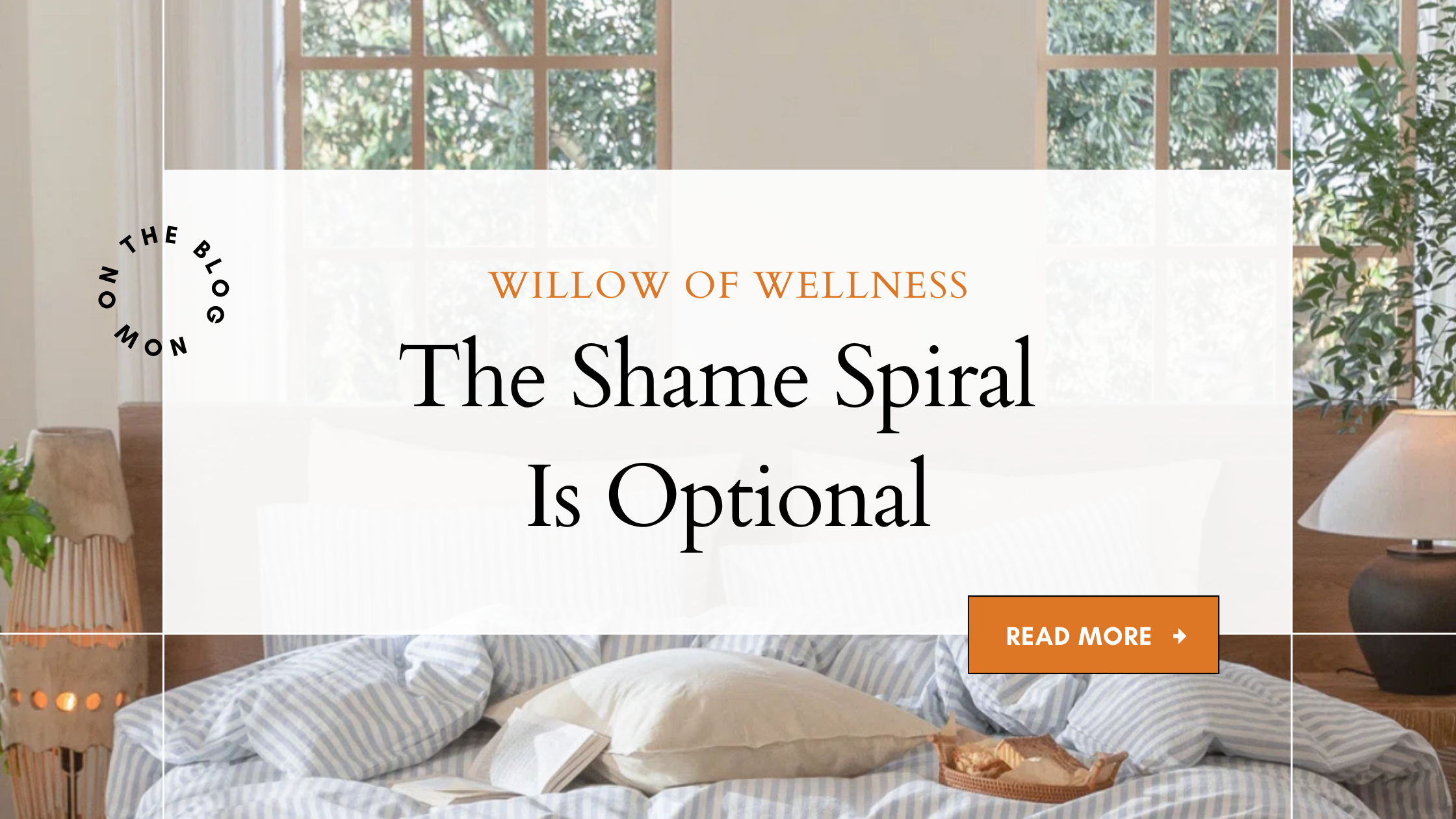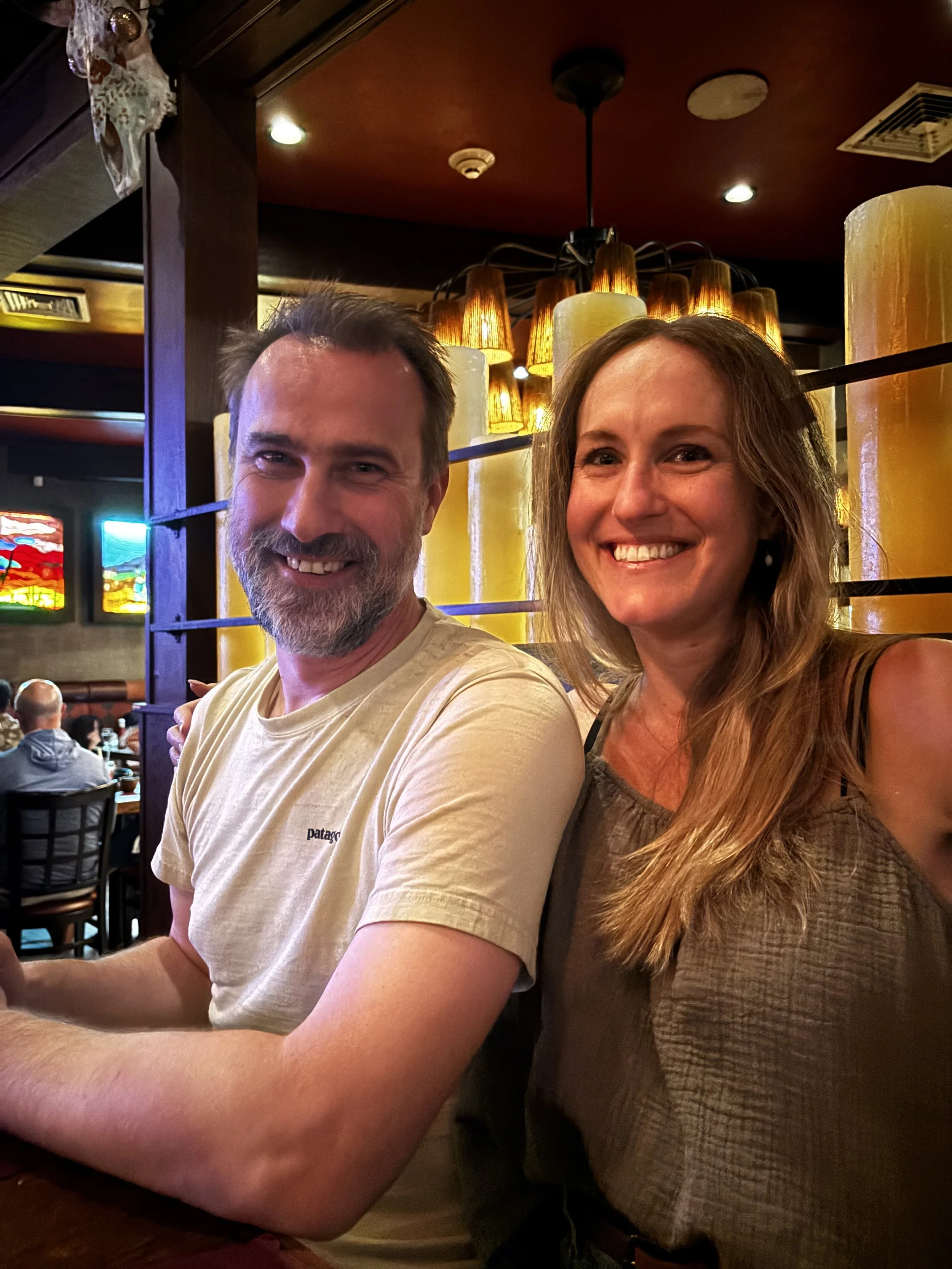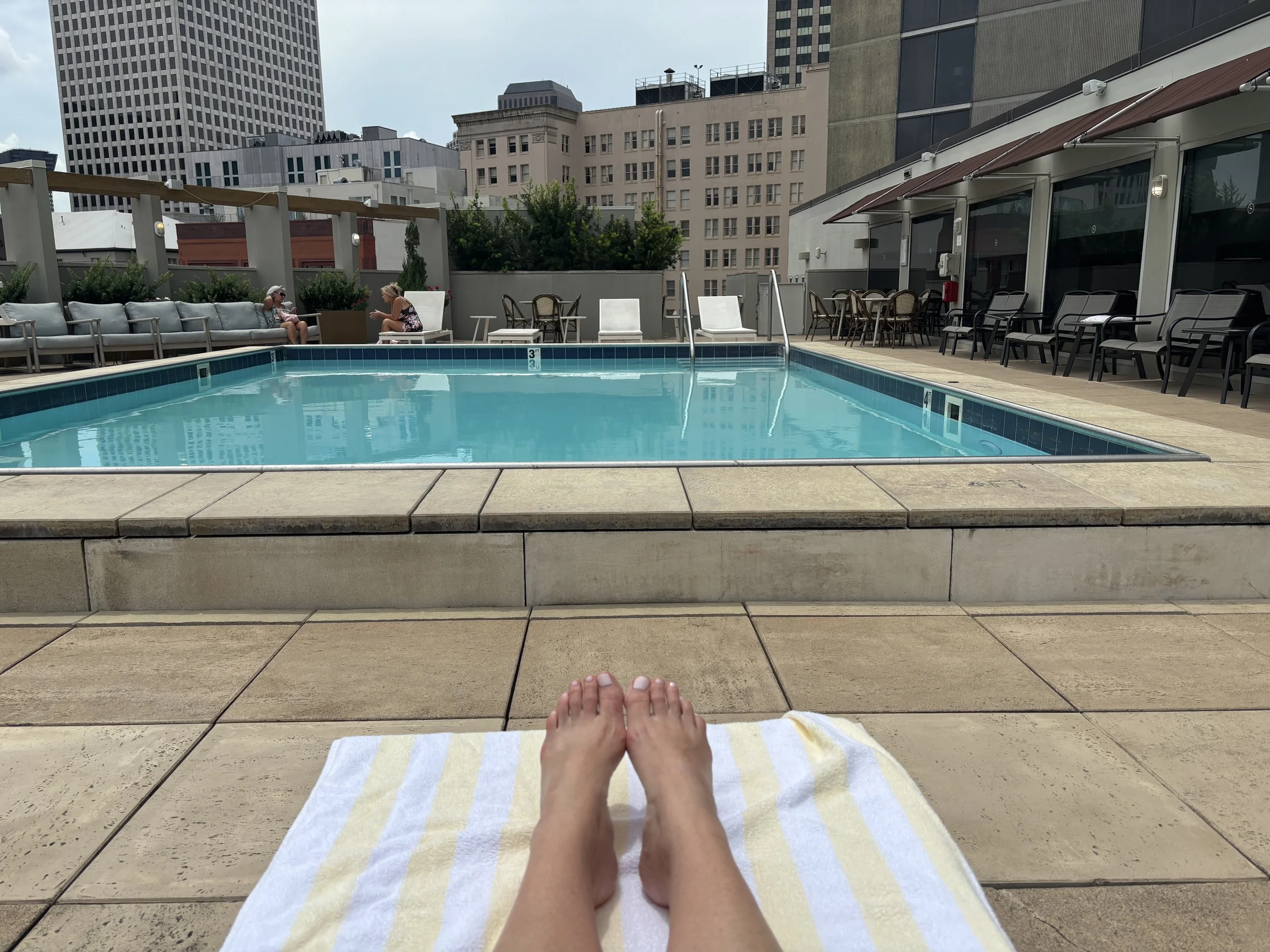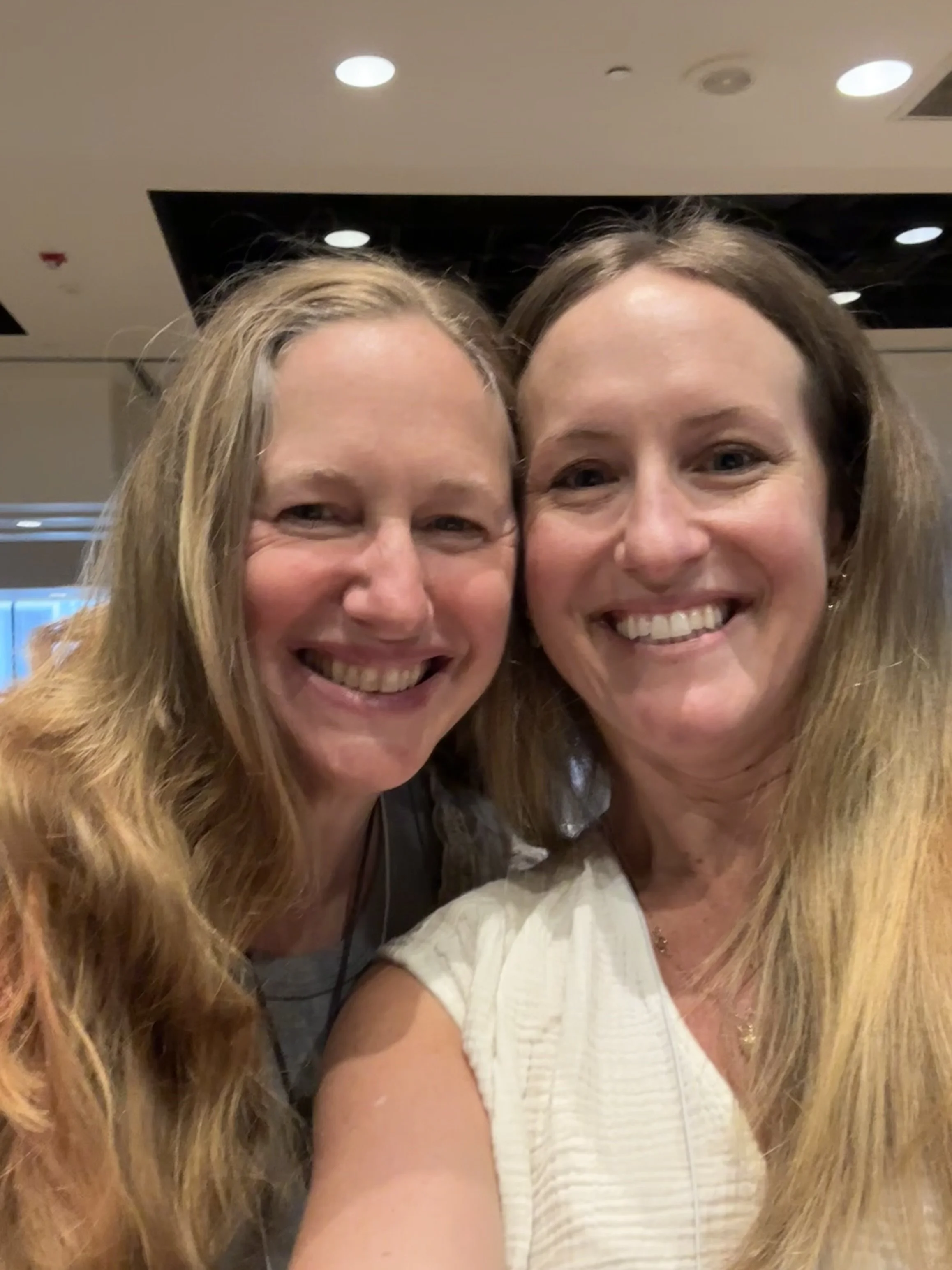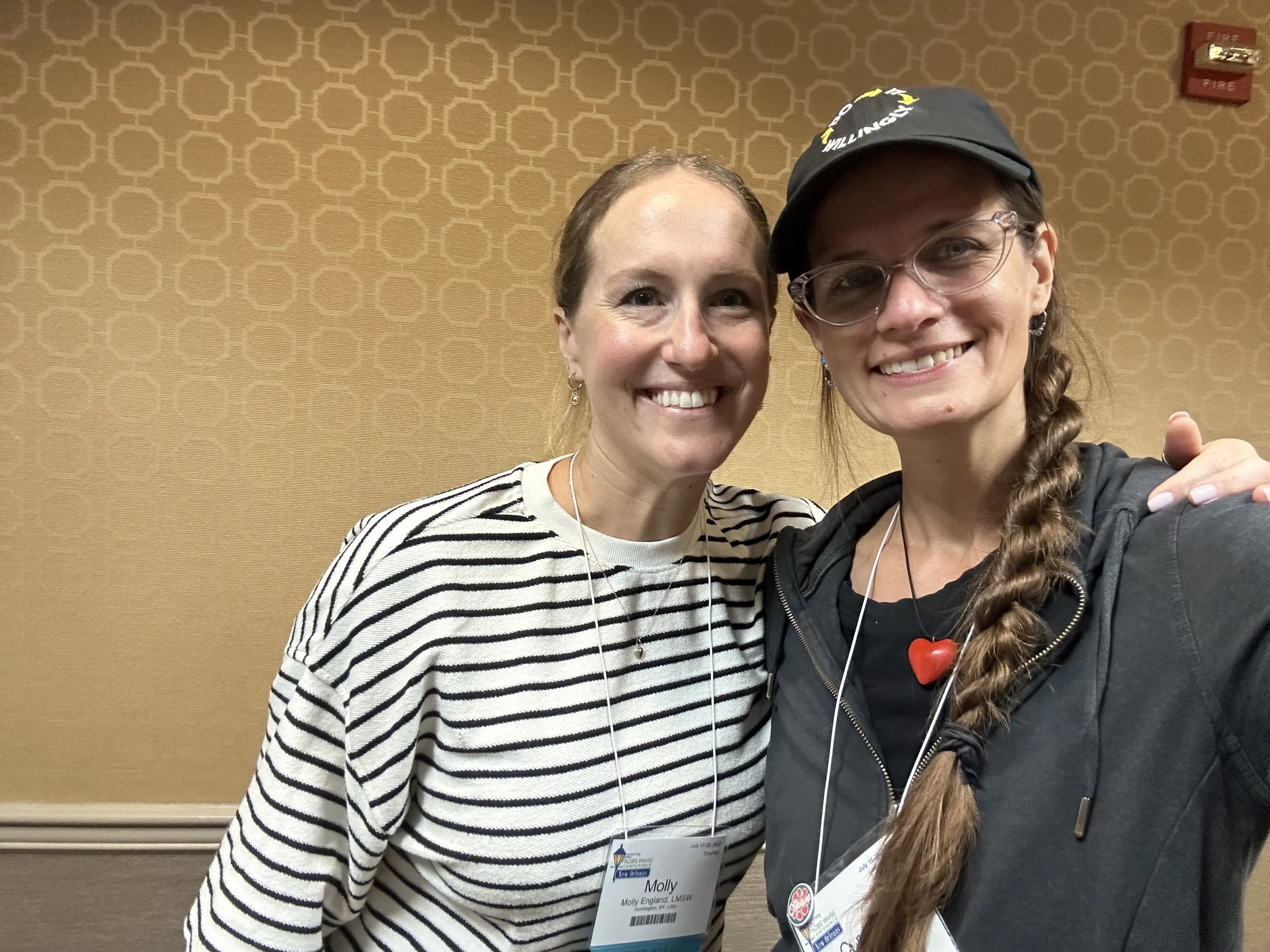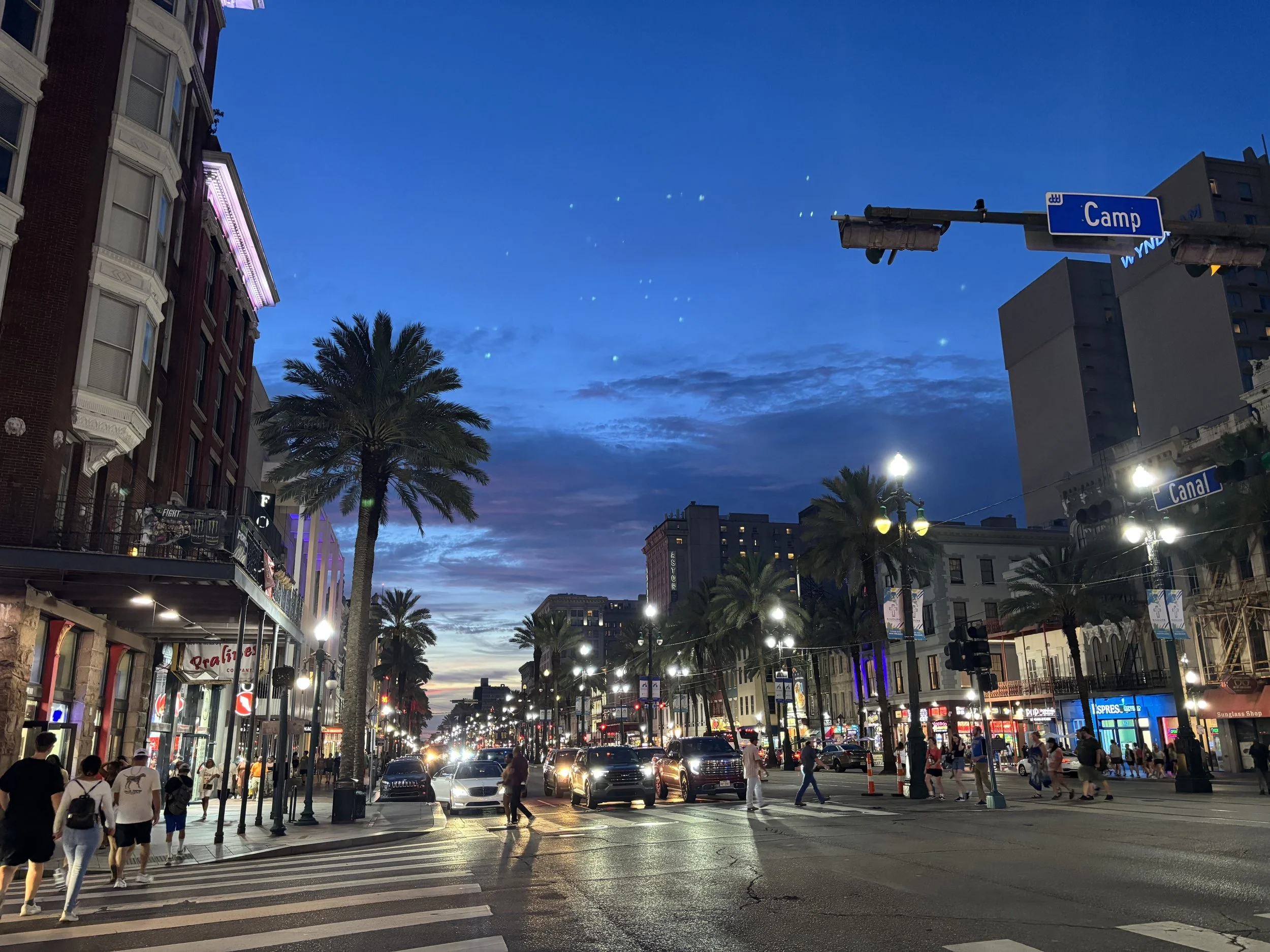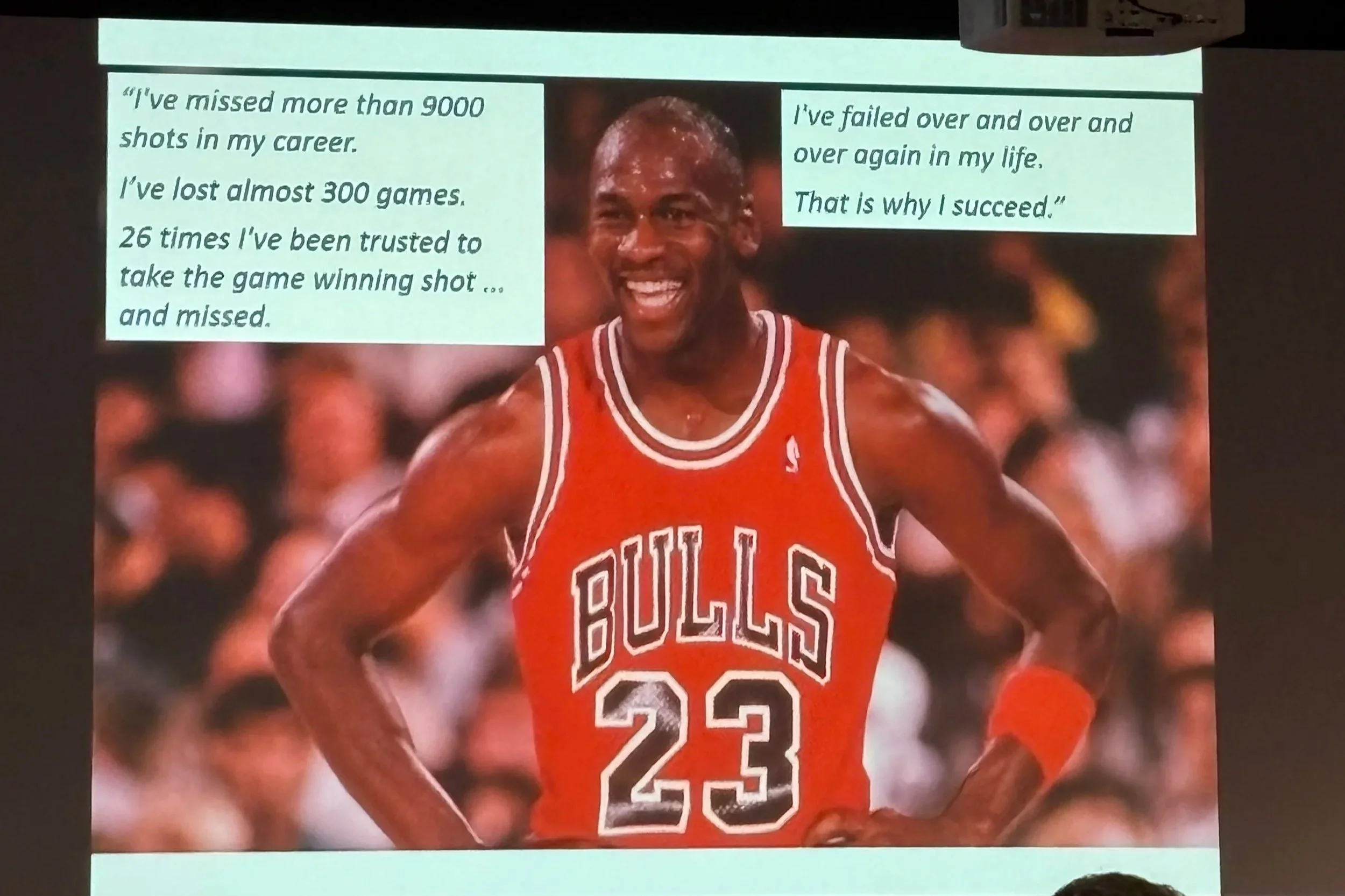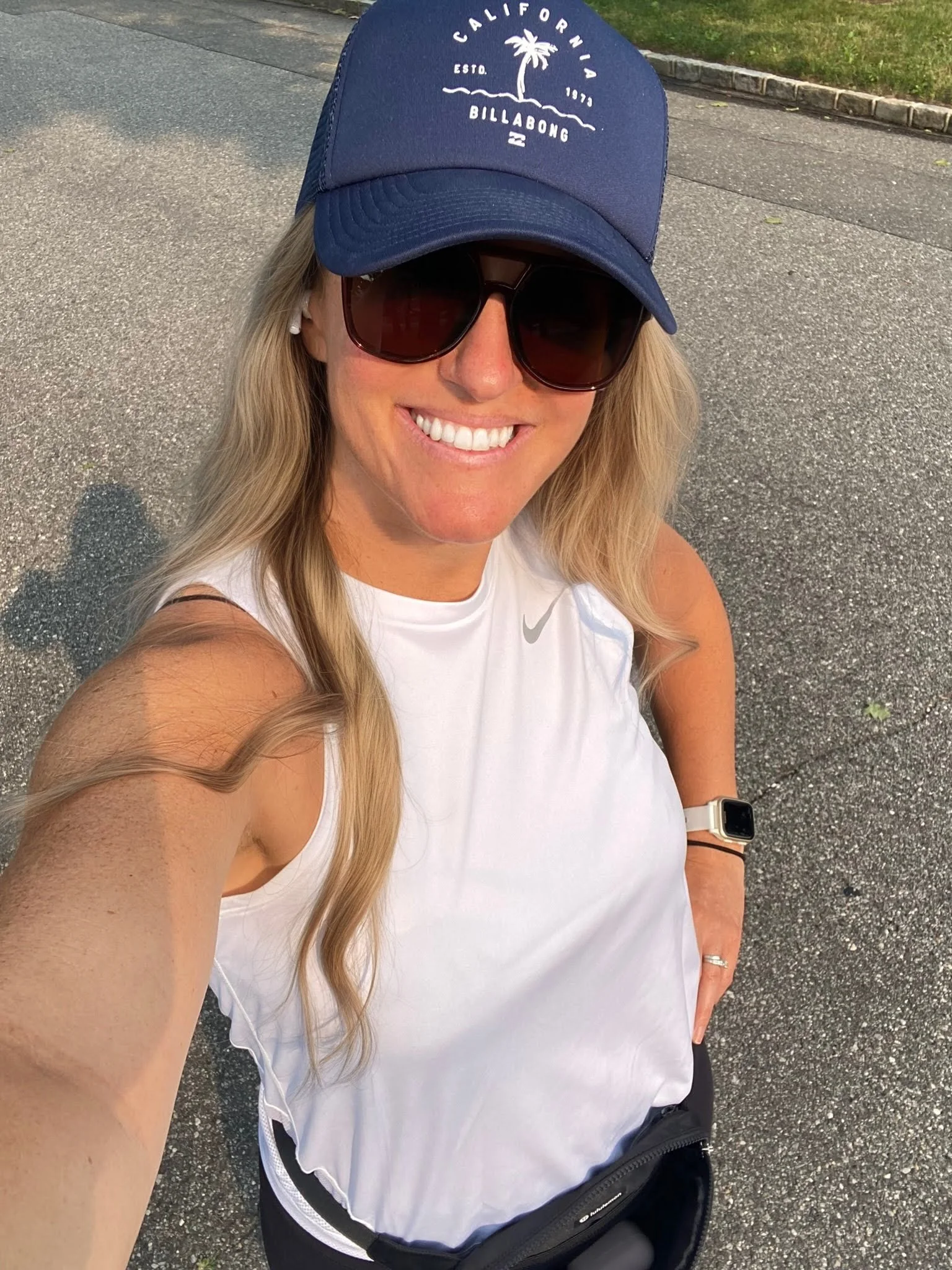The Shame Spiral Is Optional
There’s nothing inherently wrong with setting goals or intentions. The problem arises when we don’t follow through on them and then shame-spiral into an abyss of self-deprecating waste. Like cardboard left out on a rainy night, we feel heavy—laden with broken promises to ourselves and unmet expectations. Feeling like a failure is no way to start the new year.
With a few minor shifts, we can reframe our setbacks as lessons and keep moving toward our values.
beautifully messy
I feel so put together. It’s magical.
I often forget my phone and have to go back into the house to find it. I often lose my wallet, too — most recently, I discovered it on the floor between my desk and the wall.
Prioritizing Wellness: Tips for Parents, Partners, and Caring for yourself
In today’s busy world, prioritizing your health and wellness can feel impossible—especially if you’re juggling work, family, and relationships. In my recent interview with C.J. Quartlbaum on the Tell Me More podcast, I share practical strategies for thriving personally, as a parent, and in relationships.
Fall fashion—Fun?
I don’t care if you’re not at your goal weight — just buy the bigger size. Sure, it’s not cost-effective to replace clothes because you’ve outgrown your wardrobe, but that’s why seasons exist. OK, maybe seasons exist for other reasons, but that’s my reason for accepting seasons.
From “Who Am I?” to “Be You”: How Writing Helped Me Find Myself
Before leaving for college, my mom gave me a copy of Chicken Soup for the College Soul. Opening the paperback cover and reading story after story about fearless students coming of age inspired me to celebrate my transition into the uncertainties of adulthood. At that time, I was merely a reader, not yet a writer. The only person who had ever praised my writing was my 7th-grade teacher, Ms. Valenzuela at Lincoln Middle School. Her warm eyes peeked through her 90s bangs as she said, “I cried reading your ‘Who Am I’ project. It was beautifully written.” Those words stayed with me.
My tell all Podcast interview with CJ on Tell me More
When CJ invited me onto his Tell Me More podcast, I knew it would be special. What unfolded was a wide-ranging conversation about parenting, intimacy, wellness, and the importance of connection. It felt less like an interview and more like two old friends catching up—raw, authentic, and full of insights.
You know when you meet someone and it’s obvious your paths will cross again? That’s how it was when CJ and I met years ago. He interviewed me for the Cycling for Change podcast about human trafficking. He was so easy to talk to—it felt like we were old friends catching up over coffee.
So when I saw that CJ had started his own podcast, Tell Me More, we reconnected and he invited me on as a guest. It was such a blast. Nothing was prepped—it was all authentic conversation, reflections, and shared insights. CJ is wise and inspiring, and I hope you enjoy listening to our conversation. You can find more from CJ on Instagram @cj_quartlbaum and LinkedIn
Watch our podcast interview here!
Here are the show notes if you’re curious about what it’s about. We literally talk about everything—from eating our kids’ quesadilla crusts to exploring our own sexuality, and everything in between!
“CJ Quartlbaum engages in a deep conversation with wellness coach Molly England about the importance of health and wellness in our lives, particularly in the context of parenting and relationships. They explore Molly's journey from social work to wellness coaching, the challenges of prioritizing personal health while caring for others, and the significance of open conversations about intimacy and body image with children. The discussion also touches on the impact of societal norms on relationships and the importance of connection and vulnerability in both parenting and marriage. Molly shares valuable wellness tips, emphasizing the need for mindfulness, journaling, and authentic communication in fostering healthy relationships.
Molly England is a Licensed Master Social Worker in New York, certified in perinatal mental health through Postpartum Support International and trained in Lifestyle and Wellness Coaching through Harvard Medical School. With a background in trauma-informed care, she integrates evidence-based practices such as CBT, ACT, mindfulness, and solution-focused approaches. Molly works with individuals and couples navigating anxiety, depression, self-acceptance, substance use, perinatal health, and major life transitions.
In addition to her clinical and coaching work, Molly is a widely published writer whose work has appeared in The Washington Post, HuffPost, Salon, and Chicken Soup for the Soul. She is also the founder of Willow of Wellness, where she offers wellness coaching, workshops, and resources designed to help people embrace transformation and create fulfilling lives. Learn more at www.willowofwellness.com. Follow her @WillowOfWellnessllc”
Part 2: A Bar of Soap, A Bag of M&Ms, and the Therapist Who Finally Got It Right
My early therapy experiences left me cynical and disillusioned. But years later, ACT therapy transformed my marriage and reignited my faith in the power of therapy.
Part 1: The Cost of Caring—What Burnout Taught Me About Service
Advocacy nearly broke me. In stepping away, I found healing through storytelling—and a new way to serve that honors both my heart and my health.
Realizing the Potential of Contextual Behavioral Science to Alleviate Human Suffering – Reflections from Days 3 & 4 of ACSBWC 2025
Attending the third and fourth days of this year’s conference deepened my understanding of how Contextual Behavioral Science (CBS), Acceptance and Commitment Therapy (ACT), and related approaches can address complex mental health challenges – and even transform the way we work with ourselves, our clients, and our communities. From cutting-edge research on anorexia nervosa to experiential workshops on therapeutic “punishment,” psychological flexibility, neurodivergence, and stigma reduction, I left feeling inspired, stretched, and more committed than ever to integrating these approaches into my own practice.
Attending the third and fourth days of this year’s conference deepened my understanding of how Contextual Behavioral Science (CBS), Acceptance and Commitment Therapy (ACT), and related approaches can address complex mental health challenges – and even transform the way we work with ourselves, our clients, and our communities. You can check out my reflections from Day 1 and Day 2 here. From cutting-edge research on anorexia nervosa to experiential workshops on therapeutic “punishment,” psychological flexibility, neurodivergence, and stigma reduction, I left feeling inspired, stretched, and more committed than ever to integrating these approaches into my own practice.
Day 3 Highlights
1. CBS in Action: Using Modern Technology to Address Severe Eating Disorders
Dr. Rhonda Merwin’s plenary on CBS research reminded me why this framework is so powerful. Instead of viewing behaviors in isolation, CBS examines them within their historical and situational context – with the explicit goal of reducing human suffering.
Her work with anorexia nervosa and disordered eating in type 1 diabetes illustrated how ACT principles can be combined with modern technology, such as mobile apps and text-based interventions, to support recovery in both traditional (clinics) and non-traditional settings (home environments).
I was particularly struck by the FLEX ED app and the idea that treatment needs to go beyond weight restoration to address interoceptive deficits, lack of clarity, and non-acceptance of body signals. I plan to explore whether this app could be integrated into my own work with clients.
2. Rethinking “Punishment” in Therapy
The workshop with Manuela O’Connell and Robyn Walser challenged one of my biggest assumptions: that punishment has no place in therapy. Through experiential “real play” exercises, I learned that we are always reinforcing or punishing behaviors.
Key takeaways (that I’ve already applied in sessions) include:
Punish unworkable behaviors while guiding clients toward more workable alternatives.
Recognize that shame is not the enemy – it can be an opportunity for connection and change when approached skillfully.
Pay attention to micro-interactions and their reinforcing or punishing effects.
This awareness has helped me respond more intentionally, shifting clients toward flexibility without extinguishing what makes them feel seen.
Meeting friends in person for the first time.
3. Psychological Flexibility Through Improv
When my mentor suggested I attend “ACT Like Nobody’s Watching,” my first instinct was to avoid it. Improv? Too far outside my comfort zone. And yet, that was exactly why I needed to go.
The workshop pushed me into uncomfortable territory – so much so that I cried for most of it. But in the process, I gained a deeper appreciation for honoring personal barriers while still engaging in committed action. It also reminded me that growth often requires adaptation, not just perseverance. As someone who is neurodivergent, I learned how to modify participation in a way that was both challenging and self-compassionate – a lesson I’ll carry into my work with clients who are facing their own limits. I’m grateful for my partner in the workshop, the individuals who spoke up during the workshop, and the leaders who adapted the exercises and honored our experience.
4. Affirming Therapy for Neurodivergent Clients
Jennifer Kemp’s workshop on functional analysis for neurodivergent clients was both validating and transformative. Her emphasis on avoiding pathologizing language, respecting clients as the experts in their own lives, and understanding the sensory and cognitive processing differences that underlie behaviors resonated deeply.
One powerful insight: Autistic individuals do not habituate to sensory input. This helped me make sense of my own sensory overwhelm earlier in the day – and underscored the importance of creating affirming environments for neurodivergent clients.
5. Growth 2.0 – Internalizing the Good
Dr. Rick Hanson’s plenary introduced the HEAL framework:
Have a beneficial experience
Enrich it
Absorb it
Link it to other positive experiences
His reminder that the brain is like “Velcro for the bad and Teflon for the good” reinforced why intentional practice is necessary for positive neuroplasticity. While mental health care has improved in helping clients have good experiences, we must do better at ensuring those experiences stick.
Building connection and making new friends
Day 4 Highlights
6. Tackling Stigma Within the Mental Health Profession
The “Toward Us, By Us” panel was one of the most vulnerable and inspiring sessions I attended. Hearing mental health professionals share lived experiences of mental health and substance use challenges – and the stigma they faced within their own field – was a call to action.
A creative writing exercise early in the panel revealed how easily bias can cloud perception and how storytelling can humanize and shift those biases. I left with a renewed commitment to the following:
Integrate CBS principles into stigma reduction strategies.
Explore how self-disclosure in therapy can reduce shame and increase connection.
Advocate for more inclusive professional environments where clinicians with lived experience can thrive.
Personal Reflections and Takeaways
Over these two days, I was reminded again and again that:
CBS offers a compassionate, scientifically rigorous approach to understanding and influencing behavior.
Growth often comes from moving toward discomfort – but with self-compassion and flexibility.
We are always shaping behavior in our interactions – the question is, are we doing it intentionally?
Affirming, individualized care is essential, especially for neurodivergent clients.
We can (and must) work to reduce stigma – not just for our clients, but for ourselves and our peers.
At Willow of Wellness, I’ll be integrating these insights into my coaching and wellness work as well as with my therapy clients, continuing to blend evidence-based strategies with a deep respect for each client’s lived experience.
Day 2 Highlights from Association of Contextual Behavioral Science world Conference
Here’s Day 2 in all it's glory. We explored the noticing self, inclusivity, music in ACT, addiction, and human cooperation and connection.
Here’s Day 2 in all its glory. We explored the noticing self, inclusivity, music in ACT, addiction, and human cooperation and connection.
🎭 Self-as-Context Made Simple – Russ Harris
Russ Harris brought clarity to one of ACT’s most abstract processes—the “noticing self” or self-as-context—through metaphors (chessboard, sky, stage), humor, and movement-based exercises. I especially appreciated how he directly named the anxiety around experiential learning and created safety with grounding exercises.
🔑 “You’re not who you think you are—you’re the one noticing.”
From Russ Harris’ presentation on self-as-context
🌈 Gender, Sex, and Relationship Diversities SIG
This newly expanded SIG fosters community and competency around work with gender-expansive, ace/aro, kink, and non-monogamous clients. It was welcoming, intersectional, and refreshingly inclusive.
🔑 “Build spaces where all identities feel seen and served.”
🎶 Harmonizing Healing: Using Music and ACT to Support Trauma Recovery – Joann Wright & Daniel Moran
This workshop blended music and ACT as powerful tools for trauma work. Song-based memory evocation created space for emotion processing, values clarification, and grounding. A moving and memorable experience.
🔑 “A song can carry pain—and make space for healing.”
🤝 Invitation to Change: Helping Families Facing Addiction – Cordelia Kraus & Jeff Foote
This evidence-based model offers an alternative to “tough love” and detachment in supporting loved ones struggling with substance use. It centers compassion, education, and values-based connection.
🔑 “Behaviors make sense—even when they hurt. Understanding can transform everything.”
🧬 Origins of Human Cooperation – Michael Tomasello
This plenary traced how cooperation evolved uniquely in humans, with profound implications for empathy, joint attention, and cultural transmission. Watching videos of children and primates side-by-side made the point vivid and memorable.
🔑 “Humans don’t just survive—we collaborate.”
✨ Reflections from Day 2
I continue to be in awe of the breadth and depth of contextual behavioral science. Whether through neuroscience, metaphor, music, or community connection, one message rings clear:
✔ Growth is not about fixing—it’s about noticing, connecting, and expanding what’s possible.
#ACBS2025 #ACT #RussHarris #SelfAsContext #TraumaRecovery #MusicTherapy #SubstanceUseSupport #GenderAffirmingCare #PsychFlex #Tomasello #HumanConnection #MentalHealthMatters #SocialWork
What I Learned at ACBS world conference 2025 Day 1: ACT, Self-Compassion, and Contextual Science
✨ Reflections from ACBS WorldCon 2025 ✨
I had the honor of attending the Association for Contextual Behavioral Science World Conference in New Orleans, and I’m still buzzing with gratitude and inspiration. Here are the biggest takeaways from each of the incredible sessions I attended:
✨ Reflections from ACBS WorldCon 2025 ✨
I had the honor of attending the Association for Contextual Behavioral Science World Conference in New Orleans, and I’m still buzzing with gratitude and inspiration. Here are the biggest takeaways from each of the incredible sessions I attended:
Idionomics: One Size Fits None
Dr. Baljinder Sahdra’s powerful plenary reminded me that honoring individual variation is not a statistical nuisance—it’s the heart of compassionate care. Let’s rethink what evidence-based means. Group averages don’t tell individual stories. Idionomics offers a way to capture real human diversity in therapy by analyzing people’s lived data—not just randomized controlled trials.
Acknowledgment of Nonconsensual Sexual Experiences (NSEs)
I was deeply moved by research that explored the complex layers of acknowledging sexual harm—from survivor to person causing harm, or both. I learned more inclusive language like DNSE (dual nonconsensual sexual experience) and explored how people’s relationship to their experiences matters as much as the label itself.
🗣️ Acknowledgment isn’t black and white—it’s contextual, complex, and deeply personal.
Social Work SIG Luncheon
A powerful gathering of social workers from across the globe. We shared ideas for future collaborations and how to center social justice in our private practices.
🌍 Private practice can still be purpose-driven.
Mastering Creative Hopelessness (Rikke Kjelgaard)
This was glittery greatness. I learned how to compassionately help clients let go of control strategies that don’t serve them. It’s not about removing pain—it’s about helping clients change their relationship with it. With warmth, humor, and metaphors that stick, Rikke reminded us:
🐄 “We’re the only species that keeps our butt on the electric fence.”
🎶 And that repetition is the mother of all learning.
Social ACT: Therapy for the Spaces Between Us (Megan Kelly & Maria Karekla)
This session taught me how ACT can be used to improve connection—through social committed action, mindfulness, and self-compassion practices. I loved the tantruming kids in the backseat metaphor—our difficult thoughts can come along for the ride, but they don’t get to steer the car.
→ Favorite quote: “What kind of coach do you want to be for yourself?”
Lessons About the Brain (Lisa Feldman Barrett)
This blew my mind: The brain doesn’t react—it predicts, regulates, and updates. Emotion is constructed, not automatic.
🔮 You’re not just “feeling” emotions—you’re predicting them based on your body and past. Even thirst takes 20 minutes to register.
💥 So much knowledge, and that was just Day 1.
And in between all the learning? Connection, laughter, and a renewed commitment to doing meaningful work, guided by values and fueled by compassion. The NOLA backdrop could not have been more warm and welcoming. The outpouring of kindness, love, and creativity embraces you from the minute you arrive.
💛 To everyone I met, learned from, and shared space with—thank you. I left feeling not only more knowledgeable, but more compassionate and connected to others as well as to myself.
🌟 What I’m Taking Home
Embrace nuance in lived experience
Reframe what it means to grow
Slow down and stay in process
Let go of fixing—move toward meaning
#ACBS2025 #ACT #ContextualScience #MentalHealthMatters #CreativeHopelessness #TraumaInformedCare #TherapistLife #SocialWork #Idionomics #HealingThroughConnection #Acceptance #Commitment #Therapy
What Kind of Parent Are You?
Discover your parenting style—and what it means for your child’s growth.
Have you ever done or said something to your kid and then muttered under your breath, half-jokingly, “Yikes… they’ll definitely be talking about that in therapy someday”?
You're not alone—and the good news is, you don’t have to wait until they’re 30 to understand the impact of your parenting. Every moment is a chance to refine, adapt, and realign your approach—whether it’s through your tone, your word choices, or simply your presence.
It all starts with awareness and acceptance.
Discover your parenting style—and what it means for your child’s growth.
Have you ever done or said something to your kid and then muttered under your breath, half-jokingly, “Yikes… they’ll definitely be talking about that in therapy someday”?
You're not alone—and the good news is, you don’t have to wait until they’re 30 to understand the impact of your parenting. Every moment is a chance to refine, adapt, and realign your approach—whether it’s through your tone, your word choices, or simply your presence.
It all starts with awareness and acceptance.
Take this quick quiz to get a feel for your parenting style and see where you might want to go from here. Who knows—maybe I can help you get there.
🌿 Question 1: What discipline style do you prefer?
A. Hugs and kisses—you can never give too much love.
B. A long talk—we process everything together.
C. Timeouts or alone time—sometimes a little distance helps.
D. Natural consequences—I let the world teach the lesson.
🌿 Question 2: What’s your primary reason for being a parent?
A. Hearing my kids laugh—it’s pure joy.
B. Having someone to lean on as I age.
C. I’ve wanted to be a parent since I was a kid myself.
D. I made love, and here we are.
🌿 Question 3: How do you feel when your child makes a mistake?
A. I allow space for their feelings and encourage a growth mindset.
B. I feel worried and try to fix it.
C. I remind them of the rules and consequences.
D. It’s part of learning—no big deal.
🌿 Question 4: How do you structure your child’s day?
A. They need structure but also space.
B. Schedules are sacred.
C. I keep it efficient and productive.
D. We go with the flow.
🌿 Question 5: How do you feel about talking to your child about sex and bodies?
A. I’m totally open—it’s natural and our chats evolve with their age.
B. I want to give the right info, but I get nervous and overprepare.
C. I avoid it—I’d rather they learn in school or from someone else.
D. I just kind of wing it when it comes up—we keep it casual.
✅ Tally Your Answers:
Count how many times you chose A, B, C, or D. Your most frequent letter reveals your parenting style.
Parents, Talking About Sex Just Got Easier
Introducing the Conversation Bingo Board
Let’s be real—talking to our kids about sex can feel awkward, intimidating, and sometimes downright overwhelming. Many of us didn’t grow up in households where open conversations about bodies, boundaries, or consent were the norm. But we can change that for our own children.
That’s why I created the Sex Ed Conversation Bingo Board—a simple, engaging tool to help parents and caregivers start open, age-appropriate conversations with their kids about sex, relationships, and growing up.
Introducing the Conversation Bingo Board
Let’s be real—talking to our kids about sex can feel awkward, intimidating, and sometimes downright overwhelming. Many of us didn’t grow up in households where open conversations about bodies, boundaries, or consent were the norm. But we can change that for our own children.
That’s why I created the Sex Ed Conversation Bingo Board—a simple, engaging tool to help parents and caregivers start open, age-appropriate conversations with their kids about sex, relationships, and growing up.
What Is the Sex Ed Bingo Board?
The board includes 25 conversation starters that cover a wide range of topics:
Bodies and puberty
Consent and boundaries
Online safety and media messages
Healthy relationships
Curiosity and emotions
Instead of sitting down for one nerve-racking “birds and bees” talk (which, let’s be honest, nobody really wants), this bingo board invites you to have bite-sized conversations over time. Think of it as “sex ed, the short content version.”
How to Use It
Choose one square a day and pair it with a natural moment in your daily routine:
🚗 In the car
🍽️ At the dinner table
🛁 During bath time
🌳 On a walk
🛌 At bedtime
Take turns asking and answering. Let your child take the lead when they want to. There’s no pressure to have perfect answers—just focus on keeping the conversation going and creating an open, non-judgmental, and inviting space.
Why It Works
Kids are naturally curious. They also pick up messages about sex and bodies from YouTube, TikTok, school friends, and TV—some of which may be confusing, misleading, or even harmful.
With this bingo board, you create a safe space where your child feels seen, heard, and empowered to ask questions. It opens the door for trust, deeper connection, and healthier communication as they grow.
A Few Favorite Prompts
Here are a few of the questions included:
What do you think consent means?
What have you seen online that made you uncomfortable?
What messages have you heard about sex or bodies from TikTok or online?
Can you name all the body parts using the correct words?
Is there anything you’re curious about but afraid to ask?
Every square is a stepping stone to the next conversation—because learning about sex, relationships, and self-worth doesn’t happen in one sitting. It’s a lifelong conversation.
This sex ed conversation bingo board is a free tool to use and share with your community. You can print it out, keep it on the fridge, in your car, or tuck it into a parenting binder.
Parenting isn’t about having all the answers—it’s about showing up with openness, honesty, and love. You’ve got this. And I’m here to help.
—
Molly England is a licensed master social worker, health and wellness coach, and founder of Willow of Wellness. She’s passionate about helping parents create brave, compassionate spaces to talk about the things that matter most—like bodies, boundaries, and belonging.
🌿 Learn more at www.willowofwellness.com
💻 Interested in attending our next virtuatl parenting workshop? Learn more here and be the first 5 to sign up and receive a free membership to Willow of Wellness ($30 value).
📩 Want more parenting tips? Join my email list or book a free 15-minute call to talk about your family’s needs.
Self-Care Isn’t Selfish… It’s Essential (And I’m Published Again!)
I’m so honored my story is included in @chickensoupsoul: Self-Care Isn’t Selfish 🩷 Available TODAY, June 24 wherever books are sold. Flip to the first page… and tell me what you think!! Follow @willowofwellnesscoaching and please share!
It is such an honor to be included in the newest Chicken Soup for the Soul collection: Self-Care Isn’t Selfish—a powerful book filled with heartfelt and inspiring stories, all aimed at reminding us that taking care of ourselves isn’t just important—it’s essential.
This isn’t my first Chicken Soup feature, and each one has felt just as meaningful as the last. I was first published in The Empowered Woman in 2018, and again in Be You in 2020. Now, I’m so proud to return with this latest contribution in a collection that hits especially close to home.
Because let’s be real—especially for moms—it’s all too easy to put our needs at the bottom of the to-do list. How many times have you made your kids a yummy breakfast only to skip yours? Or thrown on a pair of yesterday’s leggings while your kids are dressed adorably from head to toe?
I’ve been there. We all have.
But here’s the funny thing: as soon as I started prioritizing my own needs—whether it was carving out time for rest, nourishing myself properly, or simply acknowledging my own limits—I was better able to support those around me. I felt more grounded, more present, and more aligned. And you can feel that way too.
This newest Chicken Soup for the Soul book is a gentle, powerful reminder that self-care isn’t selfish—it’s how we stay whole.
So do something kind for yourself today. Head to your local bookstore and grab a copy of Chicken Soup for the Soul: Self-Care Isn’t Selfish.
📖 My story is the very first one in the book—you can’t miss it!
With warmth and wellness,
Molly
The Health Benefits of Style: How Getting Dressed Can Boost Your Mental and Physical Wellness
When we think of healthy habits, we often focus on eating right and exercising. But what if I told you that wearing a cute outfit might be just as important for your overall well-being? I know—it sounds like a stretch. But hear me out.
“Love Yourself Before You Can Be Loved”: The Lies We Learn
From birth, we need a caregiver in order to survive — unlike baby sea turtles, who hatch and then miraculously crawl right into the ocean all on their own. If that caregiver happens to be stable and loving, we may have the privilege of developing a secure attachment style. But studies show that about 50% of children develop a different attachment style: anxious, avoidant, or disorganized.
What does all this have to do with loving ourselves?
Well, I’m glad you asked.
Can You See Happiness? What Physical Appearance Reveals About Mental Health
I can honestly say that I look good. But my mental health suffered during this time. I had yet to discover the power of psychiatric medication.
Holiday Conversations: Mastering “No” and Other Anxiety-Busting Tips
Festive social anxiety is simply social anxiety during the holiday season. It’s social anxiety with tinsel drapped over it.
Exercise will not help you lose weight: an uncomfortable truth
"‘We’ve done studies where we look at people who are really active,” including runners racing across America, Pontzer said, “and people who are really sedentary, and actually they’re burning the same number of calories,’ which helps explain why people rarely lose much weight with exercise, even as the exercise makes them healthier.” -The Washington Post
Excess and Abundance
In a sense, we’re all greedy consumers, mesmerized by the newest iPhone, the latest trend in jeans (I love my mom jeans), and the newest kitchen gadget or meal subscription that has us convinced that we can blink and dinner will appear on the table.

